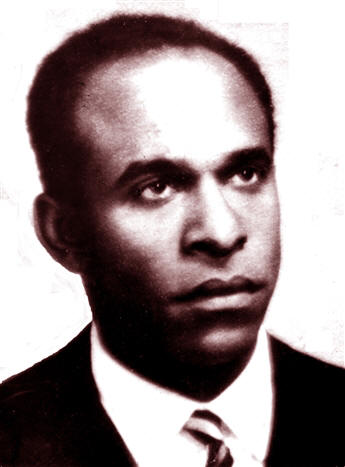Why Obama Boycotted France's Terror March
By Paul Sperry
IBDEditorials.com
Fanon would've been fine with French snub. View Enlarged Image
Two of the biggest
mysteries surrounding Barack Obama's presidency
involve his snubbing of close allies. Why did he
kiss off the French in their terror grief? For the
same reason he sent an Oval Office statue of
Churchill back to the Brits: anti-colonialism.
Anti-colonialism is
the idea that Western countries got rich and
powerful by oppressing and plundering poor countries
and peoples, and that they continue to exploit
minorities like Muslim immigrants within their
societies.
Obama's baffling
decision to skip the anti-terror rally in Paris is
rooted in this ideology, which he adopted from
writer Frantz Fanon, a French-African revolutionary
who played a major role in his intellectual
development.
If Fanon were alive
today, he'd take solace in the Muslim terror siege
of France. He'd also be proud of his Oval Office
admirer's boycott of the French government's protest
march.
In 1954, Fanon left
France for Algeria, where he joined Muslim rebels in
their fight for independence. He railed against the
French colonizers, claiming they were raping
Algerian culture by banning the Muslim veil and
other forms of Westernization — something French
Muslims complain Paris is doing again today.
The French government
expelled Fanon from Algiers and threatened to arrest
him if he caused more trouble. Fanon went on to pen
a defense of the right for colonized people to use
violence to gain independence. He titled his
treatise, "The Wretched of the Earth."
While Paris censored
the book, it became a personal favorite of Obama.
While attending Occidental and Columbia
universities, he debated it tirelessly with other
politically active black students, along with Muslim
immigrants.
Algerians, Tunisians,
Moroccans and Senegalese eventually all gained their
independence, and as part of decolonization, France
began welcoming the families of migrant workers from
the North African region. A trickle of Muslim
immigrants quickly turned into a flood, and today
France is home to some 6 million Muslims — the most
in Europe.
Now, African Muslims
are in effect colonizing parts of France.
Police have virtually
lost control over some 750 urban immigrant enclaves
that have become breeding grounds for jihadists like
the two Parisian terrorists of Algerian descent and
the one of Senegalese descent who slaughtered French
journalists, police and Jews in a bloody two-day
rampage in the City of Light. Fanon would absolutely
relish such a turnabout.
For Obama's part,
there's no doubt he sympathizes with formerly
colonized Africans and their children, a concern he
repeatedly — and angrily — expresses in his memoir,
"Dreams From My Father."
As a student of Islam,
Obama also sympathizes with Muslims' anger over
French cartoons ridiculing their prophet Muhammad.
In a 2012 United Nations speech, he asserted that
"the future must not belong to those who slander the
prophet of Islam."
All this in mind,
Obama saw the terror attack on French intellectuals
and authorities by Franco-Algerian Muslims
differently than other Western leaders and decided
to boycott the greatest anti-terror rally ever held
and one that demanded American representation.
The White House says
it was an oversight, but the snub clearly was
calculated. Obama was the only Western leader
absent, despite a clear travel schedule. He didn't
even send his vice president in his place — or his
attorney general, who was actually in Paris at the
time. He was sending a message to the French, our
oldest ally, as well as the British and other former
colonial powers locking arms in solidarity.
Obama is not a big fan
of our other ally across the pond, either. Until the
'60s, Britain colonized Kenya, and according to
Obama, mistreated his father and Muslim grandfather
(a story biographers now dispute). Winston Churchill
was prime minister at the time, and became the
object of family scorn.
So, one of the first
things Obama did when he moved into the Oval Office
was pack up the bust of Churchill and ship it back
to London, to the utter dismay of 10 Downing Street.
It's not surprising
Obama would be intellectually weaned on the writings
of Fanon. The self-described "Mujahideen of Algeria"
also agitated for Kenyan independence from Britain,
making him a hero in the eyes of Obama's
anti-colonialist father.
Barack Hussein Obama
Sr., was a Kenyan Muslim who hated the British even
more than the French. The younger Obama also
identified with Fanon's biracial background.
Obama's Parisian snub
is no puzzle. But to make sense of it, you first
must understand Obama's twisted world view. He views
all global events through the lens of Western
colonialism and imperialism. Then, more narrowly,
you must understand his acknowledged reverence for
the militant anti-colonialist Fanon, who despised
the patriarchal French establishment.
Anti-colonialist
sympathies explain Obama's French disconnection just
like they explain his ongoing hostility toward
Israel, his shocking appeasement of Castro and his
retreat from Iraq, Afghanistan and the broader War
on Terror.
• Sperry, formerly
IBD Washington bureau chief, is author of
"Infiltration: How Muslim Spies and Subversives Have
Penetrated Washington."


